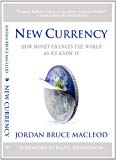
New Currency is an exploration of money’s untapped power to change the world. In the midst of a devastating global financial crisis, out of control government spending and grave problems such as terrorism, energy security and climate change, people all over the planet are waking up to the need for profound shifts in the way we respondto these challenges.
In the first half of the book, MacLeod establishes money as the primary leverage point for systemic transformation. He discusses the emergence of a new way of designing money that successfully reversed a town's 35% unemployment rate to full employment during the Great Depression. MacLeod argues that even while successful and endorsed by eminent economists Irving Fisher and John Maynard Keynes this financial innovation was mostly forgotten, largely because society did not have the shared context to make sense of it and understand its transformative potential. We therefore missed its enormous power to change the world.
With the global financial crisis and emergence of greater understanding of quantum reality, consciousness, and digital technologies, MacLeod argues that humanity is now ready to take a second look at this marked economic innovation. He believes that we are on the verge of making a momentous leap in social dynamics and at the heart of this shift is changing the way we see and hold money.
Rather than seeing money as a fixed object, MacLeod takes us on a journey throughout human history to demonstrate how human consciousness has evolved over time. At each stage of development, the economic tools that were available varied markedly. Yet, with the emergence of new ways of seeing the world, human societies have developed profound breakthroughs in how they use money which have in turn reconfigured economic and social order and grounded deeper values and meaning into the heart of a society.
By understanding the evolving relationship between human values and money, we come to understand that our economic problems are wholly in our power to confront and transcend. MacLeod argues that while our monetary and economic systems have been unprecedented in their power to generate wealth and innovation they are also directly correlated to a destructive strand of cultural narcissism. This in turn leads to real economic development on the one hand but manifestations of exploitation, myopic decision making, environmental degradation and selfishly burdening future generations with our debt and resource consumption on the other.
Today, we stand at a critical point in world history where the choices we make will have profound implications for the future of humanity and the well-being of the planet. In the second half of the book MacLeod concludes that neither socialism nor laissez-faire approaches are powerful enough to address the challenges of the 21st century. MacLeod presents a clear and compelling vision for an economy and global society that is simultaneously more free, inclusive and resilient than anything we have ever known. It is only through monetary innovation and reconfiguring the dynamics of the marketplace, he argues, that we will be able to create the conditions to resolve the most complex problems in human history.
Already have an account? Log In Now